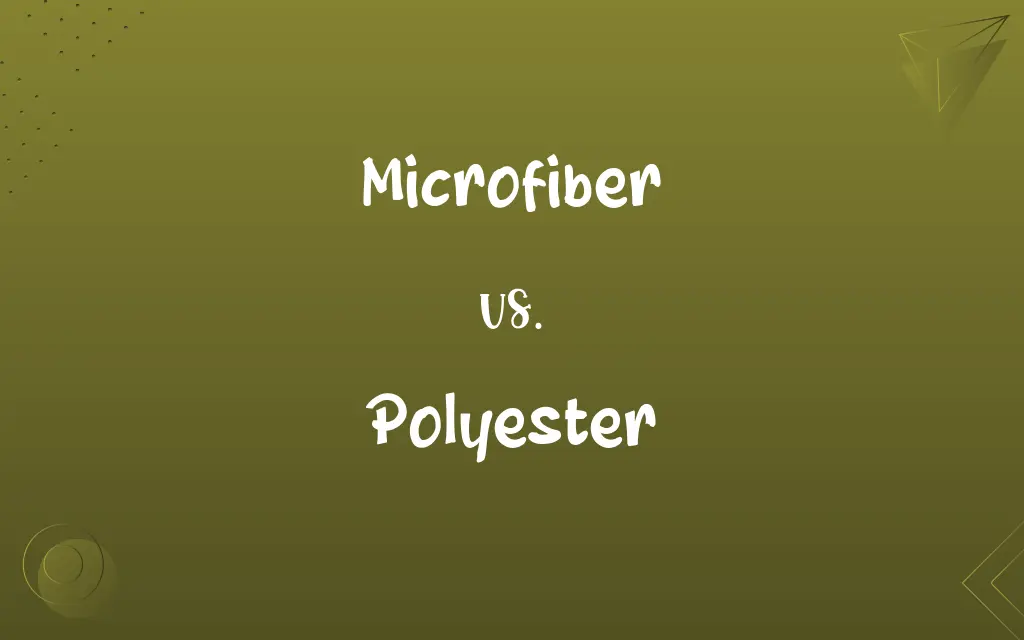Microfiber vs. Polyester: Know the Difference

By Dua Fatima & Shumaila Saeed || Published on March 1, 2024
Microfiber is a type of polyester with finer threads, offering superior softness and cleaning ability, while polyester is more versatile and durable.

Key Differences
Microfiber, a synthetic fabric, is known for its exceptionally fine fibers, which contribute to its soft feel and superior absorbency, making it ideal for cleaning cloths and delicate fabrics. Polyester, on the other hand, is a broader category of synthetic fibers known for its durability, resistance to wrinkles, and quick-drying properties, making it a favorite for clothing, upholstery, and outdoor gear.
Dua Fatima
Mar 01, 2024
The production of microfiber involves splitting polyester fibers into strands thinner than silk, resulting in a fabric that can effectively trap dust, dirt, and moisture. This splitting process is not used in regular polyester manufacturing, which focuses on creating strong, resilient fibers suitable for a wide range of applications.
Shumaila Saeed
Mar 01, 2024
Microfiber's fine threads allow for a higher density weave, making it exceptionally effective at capturing particles without leaving scratches. This makes microfiber cloths ideal for cleaning sensitive surfaces like glass and electronics. In contrast, polyester's structure provides less surface area, making it less effective for delicate cleaning tasks but excellent for garments that require structural integrity.
Dua Fatima
Mar 01, 2024
Both materials are easy to care for, microfiber requires specific laundering practices to maintain its cleaning efficiency, such as avoiding fabric softeners and high heat. Polyester fabrics are less finicky, often requiring just a simple wash-and-dry routine.
Shumaila Saeed
Mar 01, 2024
In terms of environmental impact, both microfiber and polyester raise concerns due to their petroleum-based origins and contribution to microplastic pollution. However, there is growing interest in recycling polyester products and developing more sustainable production methods for both materials.
Shumaila Saeed
Mar 01, 2024
ADVERTISEMENT
Comparison Chart
Composition
Ultra-fine synthetic fibers, mainly polyester or nylon
Synthetic fibers, primarily polyethylene terephthalate (PET)
Dua Fatima
Mar 01, 2024
Texture
Softer, plush feel
Can range from soft to coarse, depending on the weave
Shumaila Saeed
Mar 01, 2024
Cleaning Efficiency
High; traps more dirt and moisture
Lower; less effective at trapping particles
Dua Fatima
Mar 01, 2024
Durability
High, but can be compromised by improper care
Very high; resistant to wrinkles and shrinking
Hifza Nasir
Mar 01, 2024
Environmental Impact
Contributes to microplastic pollution; requires careful laundering
Contributes to microplastic pollution; more easily recycled
Shumaila Saeed
Mar 01, 2024
ADVERTISEMENT
Microfiber and Polyester Definitions
Microfiber
A synthetic fiber finer than one denier or decitex/thread, often used for cleaning.
The microfiber towel easily removed the smudges from the glasses.
Shumaila Saeed
Feb 25, 2024
Polyester
A category of polymers used to make synthetic fibers, known for their durability and resistance to many chemicals.
The polyester jacket repelled water and wind, making it perfect for the hike.
Shumaila Saeed
Feb 25, 2024
Microfiber
A cloth made from microfiber, known for its ability to trap dust and absorb liquids.
I used a microfiber cloth to clean my laptop screen without leaving any streaks.
Dua Fatima
Feb 25, 2024
Polyester
A type of synthetic resin used in the production of fiberglass and coatings.
The boat hull was reinforced with polyester resin for extra durability.
Dua Fatima
Feb 25, 2024
Microfiber
Bedding made from microfiber fabric, offering a soft, comfortable sleep experience.
The microfiber sheets kept me warm through the night without overheating.
Hifza Nasir
Feb 25, 2024
ADVERTISEMENT
Polyester
A fluffy, synthetic filling used in pillows and comforters.
The polyester fiberfill in the quilt made it extra cozy and warm.
Dua Fatima
Feb 25, 2024
Microfiber
Furniture covered with microfiber fabric, combining durability with a soft texture.
The microfiber sofa felt soft and comfortable, yet it was durable enough for daily use.
Dua Fatima
Feb 25, 2024
Polyester
A fabric made from polyester fibers, used in a variety of garments and home textiles.
The polyester curtains were lightweight and resisted fading from sunlight.
Shumaila Saeed
Feb 25, 2024
Microfiber
A mop made with microfiber pads, designed for efficient cleaning and easy dirt removal.
The microfiber mop cleaned the floors more effectively than traditional mops.
Hifza Nasir
Feb 25, 2024
Polyester
Polyester made from recycled materials, such as PET bottles, contributing to sustainability.
The recycled polyester t-shirt felt good both in fit and environmental impact.
Shumaila Saeed
Feb 25, 2024
Microfiber
(American spelling) Very fine synthetic fiber; cloth made of such fiber.
The spilled wine hadn't stained the microfiber couch.
Dua Fatima
Feb 24, 2024
Microfiber
An extremely fine synthetic fiber that can be woven or knit into textiles with the texture and drape of natural-fiber cloth but with enhanced washability, breathability, and water repellancy.
Dua Fatima
Feb 24, 2024
Polyester
A complex ester used for making fibers or resins or plastics or as a plasticizer
Dua Fatima
Feb 24, 2024
Polyester
Any of numerous synthetic polymers produced chiefly by reaction of dicarboxylic acids with dihydric alcohols and used primarily as light, strong, weather-resistant resins in boat hulls, textile fibers, adhesives, and molded parts.
Dua Fatima
Feb 24, 2024
Polyester
Any of numerous synthetic resins; they are light and strong and weather resistant
Dua Fatima
Feb 24, 2024
Repeatedly Asked Queries
What is microfiber made of?
Microfiber is made of ultra-fine synthetic fibers, primarily polyester and nylon.
Dua Fatima
Mar 01, 2024
Is polyester good for outdoor clothing?
Yes, its durability and quick-drying properties make it suitable for outdoor apparel.
Dua Fatima
Mar 01, 2024
Which is softer, microfiber or polyester?
Microfiber is generally softer due to its finer threads.
Shumaila Saeed
Mar 01, 2024
Can polyester be recycled?
Yes, polyester can be recycled, and there's growing interest in recycling polyester garments.
Dua Fatima
Mar 01, 2024
Do both microfiber and polyester contribute to microplastic pollution?
Yes, both can shed microplastics into waterways during washing.
Dua Fatima
Mar 01, 2024
Is all polyester waterproof?
Not inherently, but it can be treated to resist water.
Hifza Nasir
Mar 01, 2024
What are the main uses of polyester?
Clothing, upholstery, and various industrial applications.
Dua Fatima
Mar 01, 2024
Is polyester the same as microfiber?
No, polyester is a broad category of synthetic fibers, while microfiber is a specific type of polyester with finer threads.
Shumaila Saeed
Mar 01, 2024
Can microfiber cloths be washed with regular laundry?
Yes, but avoid fabric softeners and high heat to maintain their effectiveness.
Dua Fatima
Mar 01, 2024
Why is microfiber preferred for cleaning electronics?
Its fine threads can trap dust without scratching delicate surfaces.
Shumaila Saeed
Mar 01, 2024
Are microfiber cleaning cloths better than cotton?
Yes, for most cleaning tasks, as they trap more dirt and absorb more liquid.
Hifza Nasir
Mar 01, 2024
Is microfiber environmentally friendly?
While it's effective for cleaning and uses less water, its production and disposal contribute to microplastic pollution.
Shumaila Saeed
Mar 01, 2024
How can the environmental impact of using polyester and microfiber be reduced?
Choosing recycled materials and proper laundering techniques can help minimize their environmental footprint.
Hifza Nasir
Mar 01, 2024
How long do microfiber cloths last?
With proper care, they can last for several hundred washes.
Dua Fatima
Mar 01, 2024
Does polyester shrink?
Polyester is resistant to shrinking, especially compared to natural fibers.
Shumaila Saeed
Mar 01, 2024
Share this page
Link for your blog / website
HTML
Link to share via messenger
About Author
Written by
Dua FatimaCo-written by
Shumaila SaeedShumaila Saeed, an expert content creator with 6 years of experience, specializes in distilling complex topics into easily digestible comparisons, shining a light on the nuances that both inform and educate readers with clarity and accuracy.







































































